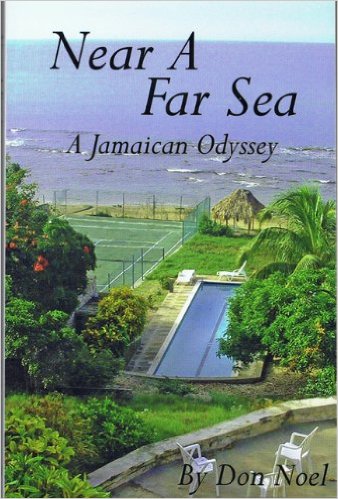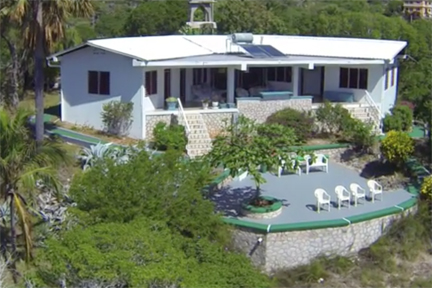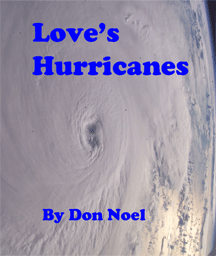Published by Tigershark Magazine in July 2018
Russell wondered if he’d lost the trail. The clouds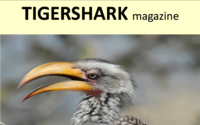 that obscured the peak all day had settled leadenly on the flanks, thick with fog and intermittent rain. He felt chilly. Although Mount Kenya straddles the Equator, there were snowfields where the peak soared to 17,000 feet — an amazing mile higher than where he’d nibbled lunch and started back.
that obscured the peak all day had settled leadenly on the flanks, thick with fog and intermittent rain. He felt chilly. Although Mount Kenya straddles the Equator, there were snowfields where the peak soared to 17,000 feet — an amazing mile higher than where he’d nibbled lunch and started back.
He must have come down a thousand feet already. It never got below freezing down here, the rangers said. Little comfort. The trail was often a sprawling braid of tracks made by hikers seeking better footing through thin brush and scrub trees.
Peering through scuds of mist for the next marker-cairn, he longed for Sue. She’d had a keener eye. I’ve come halfway around the world, he thought, displaced from everything familiar, without leaving grief behind.
He was tiring; each step made his knees ache. Gravel slithered in tiny avalanches into improbable patches of clay and mud. He ought to have a staff. Foolish pride not to use one; even younger people did nowadays. If he took a shortcut he could steady himself on stunted trees; a broken branch to his left suggested a spidery track others had taken. Ahead was a series of long switchbacks. The shortcut would be steeper, but would surely intersect the trail farther down.
They’d started together this morning at the park gates at 8,300 feet, drawn together by the economies of renting a van from Nairobi, all but one of them college kids in preppy hiking clothes from L.L. Bean or Land’s End. Mike, the more mature one, shared Russell’s taste for Levis and scuffed boots. Russell, though, was much older, his faded Red Sox tee-shirt loose on his frame, hair under his baseball cap now salt with no pepper.
“Let’s rendezvous at the Met Station up above before climbing higher,” Mike said to the group. “We should keep track of one another.” Russell’s kind of guy: sensible. About his height but huskier, hair cut short to minimize its coppery color. Probably ten years older than the others, he too seemed to have come alone.
They set out, Mike quickly in the lead. Joe, a strapping blond kid, initially held back on Russell’s account. Solicitous of age. “You okay?”
“You go ahead, thanks. I’m not fast, but I’m steady,” he’d answered. “You may stop to take a breather, but I just keep going. That’s my style. Don’t worry; I may pass you later.”
And so he had. The road, unpaved, too steep for the van, wound six miles up through fragrant cedars and then giant fig trees. A few had paused where big black-and-white monkeys made spectacular leaps through the branches. “The warden said they’re a favorite of leopards,” one of the girls said. “Ooohh!” said another, “Leopards?” “All over the mountain, I heard,” someone else chimed in.
Young Joe called out as he trudged past them. “Did you say your name was Russell, or Steady Eddie?” His smile seemed to say he meant it a gentle tease of himself, too.
“Steady Eddie,” Russell answered, liking the sound of it. Two hundred yards farther he wished he’d said something about Stop-and-Go Joe.
He found the rest of them at the Met Station, the meteorological observatory on a little plateau at 10,000 feet, a few government cabins and hikers’ lean-tos. Three Land Rovers waited the return of people who had gone mountaineering far above.
Early in their marriage he and Sue took a climbing course. After five days of ropes, pitons, belays and rappels, they decided it wasn’t their thing. “I like sharing with you,” she said, “not just telling you to hold here or pull there.” They favored hiking that took stamina, but left time to point out a flower, hold hands to admire a view, even to find a secluded glade where they could make love amid the fragrance of crushed ferns. Remembering, it felt distant.
Water ran from a pipe poked into the hillside; a faded wooden sign said “Potable”. He cupped his hands for a cool drink, rinsed the sweat off his face, then refilled his water bottle and stowed it in his backpack, festooned with park souvenir cloth badges Sue had sewed on over the years. He decided to leave his folded red-checked shirt and grey poncho in the pack. The fog was lowering; he would want dry outer clothes up above.
Stop-and-Go Joe caught up and joined the group in a lean-to. “Come take a break,” he called. “Have some lunch with us.”
His sweaty tee-shirt would be chilly if he stopped long, but he could almost hear Sue: “Just a few minutes, Russ – a little company will do you good.” He wished their daughter Lorelei had agreed to use her mother’s ticket. She’d have found most of them too young, but would have liked Mike, the redhead.
A young couple, obvious newlyweds, offered him a sandwich from a pile they’d brought. “No thanks,” he said. He got up, pouring a little trail mix into his hand. “I munch as I go along.” But he hiked a hundred yards before the lump in his throat let him swallow it.
The auto road ended abruptly, and a much narrower trail found its way through dense bamboo thickets. Switchbacks, some a quarter-mile long, led upward through a belt of scrub trees, finally reaching the promised “vertical bog,” a steep moorland of broken rock and boulders, thin grass, low brush and those inexplicable marshy patches. From there, they’d been told, one might get a glimpse of the craggy peak where the climbers were.
The clouds didn’t lift. The mountaineers must have had to belay up rock faces in an ice-fog, undoubtedly glad to have native guides.
He’d stepped aside to let Mike pass him in the scrub belt. “Thanks,” Mike said. “I’ll see you up above.” And sure enough, Russell caught up where Mike was munching a sandwich before turning back.
“You look fit,” Mike told him.
“Not bad for an old man,” Russell smiled. “But not compared to you. You have an outdoor job, do you?”
“Hardly. Computer programmer. You’re a bachelor?
“No, I lost my wife,” Russell told him. Saying it made him feel displaced. “Four months ago. Cancer of the pancreas.”
“I’m sorry.”
“Thank you. I’ll show you a photo back in Nairobi. A handsome woman. Married 35 years.”
“Pancreatic cancer moves fast,” Mike offered.
“Yes. I guess that was a blessing.”
“You came anyway?”
He’d already paid, Russell explained. “I’d hoped until the last minute that our daughter Lorelei would come with me. You’d like her. Our type.” He’d left it at that.
Russell glanced now at his watch. Three o’clock. An hour since they started back. Four more hours’ daylight at best. He wondered how far ahead Mike was. He would risk the shortcut.
*
The leopard wakened as the afternoon waned. It was big for its breed: Four feet in the body, eight feet from nose to tail, 150 pounds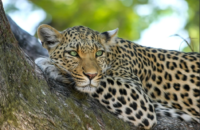 of muscle. Tawny yellow, with black-brown rosettes like paw-marks. It had dozed on the branch of a spreading tree.
of muscle. Tawny yellow, with black-brown rosettes like paw-marks. It had dozed on the branch of a spreading tree.
The African leopard is formidable. It can leap into a tree-crotch, its kill in its jaws to cache for a later meal. It dispatches its prey more neatly than the lion or cheetah, killing even Cape buffalo several times its weight. It stalks noiselessly, seeing as well by night as by day. In one easy leap, the cat jumped down and set off to prowl the mountain.
*
Mike was at the Met Station by three, wondering if Russell might be in trouble. He considered going back up the trail. He had the stamina: A halfback in college, he kept himself fit.
The man was old enough to be his father, if Dad were still living. Seemed methodical: Tall, almost gaunt; steel-rimmed glasses; gray hair in the crew cut favored by an earlier generation. A bookkeeper of some sort, but somehow not out of place here.
Mike had eaten a first sandwich with the others at the Met Station when Russell stopped and then tromped on. He soon overtook the older man. Hiking alone himself, he hadn’t worried about Russell’s not having a companion. He was eating his other sandwich when Russell caught up and nibbled the last of his gorp, wiping his hands on a red bandana.
They chatted the way chance acquaintances do, revealing little of themselves. Russell said his daughter wasn’t like these kids with their chic safari clothes. He would introduce her when they got back; they lived not far apart.
“I’m sure I’d like to meet her,” Mike said noncommittally.
“You’re a bachelor too?”
“Only recently. Girlfriend broke it up when I planned this trip. Didn’t share my passion for the outdoors.”
He let it go at that. But in his mind he heard Trudy: “Mike, you turn everything into a competition. A walk in the woods becomes a race. You even act as though sex was some kind of contest.” That hurt. He had found himself earlier today eyeing one of the college girls in this group, which made him feel like an aging lecher.
The drizzle began as they finished lunch; both put on wool shirts and ponchos to start down. Russell wiped the fog off his glasses with the bandana to consult a drugstore wristwatch. “Two o’clock.” They’d come up from the Met Station in two hours. “I usually get back down in half the time, but I won’t do that well in this wet footing.”
Mike had been with the others now for twenty minutes. He thought again about Dad.
“Michael,” – like putting a finger on the scale, Dad always assumed the full first name gave his advice weight – “self-reliance is the thing. Don’t depend on others.” His blind spot, it turned out. Dad insisted on hunting alone, and died because no one went looking for him when he got in trouble.
Mike reluctantly decided against starting back up. Russell didn’t seem the type to take reckless short-cuts down a strange mountain — and if he did, they might miss each other.
*
Russell wondered if he were on a game trail. He hadn’t until now thought much about animals, but the shortcut had widened into a real track. There were elephants on Mount Kenya, all the way up to timberline, they’d been told. Hard to imagine. Elephant droppings must be huge; he would watch.
He fished his plastic cigarette box and lighter from beneath the poncho. He smoked only a cigarette or two a day, but there were times when the taste and stimulus of the tobacco were good. He took a drag, holding it, not drawing deep enough to get into his lungs.
Smoke. In the week before Sue’s death, starved for a woman’s touch, he’d gone to a smoke-filled bar, looking for a prostitute. Found one who made his loins ache. He felt his cheeks redden now, just remembering. When he realized what a contemptible thing he was doing, he bought the woman another drink and left her with it. Maybe he had been brought here so that this mountain could punish him. He deserved worse than a few hours’ aching knees.
It would be wisest to turn back, regain the marked trail. His legs balked. Besides, the rain-runnels had coalesced now into a brooklet. A larger stream, surely a confluence of many rivulets like this, had tunneled under the auto road as they neared the Met Station this morning. Even if he didn’t intersect the switchbacked trail farther down, he would surely find the road. If you’re lost on a mountain, following a stream is the best way down. He did not think of himself as lost, though.
Three-thirty. He savored a last pull on the cigarette, stubbed it out and tore the stub to scatter the last crumbs of tobacco, rolling the paper into a tight ball; field-stripping, soldiers called it. Leave nothing behind. He started down again with his hands tucked into the warm armpits of the wool shirt, but had to take them out for balance.
*
The rest of the group, Mike found, had walked up a few hundred yards into the bamboo, but turned back when they encountered the fog. They’d managed to start a smoky, cheerless fire in a stone lean-to where they could wait. They were subdued when he showed up without Russell, but not worried.
“The Land Rover guys and their guides haven’t come down yet,” the blond kid named Joe said. “Even if he fell and hurt himself, they’d find him, help him down.”
A park warden appeared, a short, dark muscular man in a khaki uniform with a badge on his broad-brimmed hat. He was glad to regale them about the flora and fauna and geology. He spoke in formal phrases probably learned in warden school. Tourism had driven away the wildlife in some parts of Africa, he said, but here the original inhabitants still prevailed.
“We watched some monkeys on the way up,” said Annette, the one Mike had found interesting. “Black and white, playing in some huge trees.”
“Giant figs,” the warden said. “Colobus monkeys.”
“Big,” she said. “A single pelt would make a cute jacket.”
Mike was embarrassed for her. This must surely be all forest preserve.
“They’re protected,” the warden confirmed.
“How about leopards?” asked the blond kid, Joe. “I see leopard coats sometimes, back in New York.”
“We can’t catch all the poachers,” the warden said, disdain in his voice.
Mike tried to steer the conversation back. “But they’re up here?”
“Oh, yes. They lie up during the day, and begin hunting as dusk nears.”
“What does a leopard hunt?” Joe asked.
“Near human habitation, it will eat carrion, but it prefers little dogs.” He obviously enjoyed allowing himself a grin at the girls’ wide eyes. “In the mountain forest, it is fierce.” He tightened fists to his chest and thrust them forward abruptly, making the fingers into claws. “Pounces from trees.”
“Are there man-eaters?” Joe persisted.
“Very rare. They’re opportunistic, though.” He became curt, apparently wanting to get this amateur group off his mountain. “You should start down. They’ll be stirring by now.”
“Ooohh!” said Annette.
“We’re waiting for one of our group,” Mike explained. “An older man. They can start down. I’ll go back up looking for him.”
“No,” the warden said. “He might stray from the trail; you’d miss him. Voices don’t carry in the fog. You wait here for a time; I’ll be nearby.” He turned to the others. “You should watch for your friend on the way down. If you encounter him, have the park gate man call me on our radio-telephone.”
Mike waved them off cheerfully, then foraged in the woods for dry branches to build up the fire. Dad had died in a thin forest like this, of an accidental gunshot. His pals at the hunting lodge wondered when he wasn’t back for supper, but thought he might be holed up somewhere hoping for one last shot. Dad hated having anyone clumsily alert his quarry, so no one set out to look for him. It probably took a long time for him to bleed to death, the coroner said.
*
The path was narrowing; Russell had to shoulder through a patch of brush. If the trail were made by elephants, they must have taken some turn that he’d missed. The brush tore his poncho; he tried not to widen the tear.
Then he saw the buffalo. Six, browsing in a grassy opening downstream. They were all over Kenya: great muscular animals, bigger than oxen, enormous curling horns rolling out from bovine faces. Placid-looking, but they’d been warned: The Cape buffalo is among the least predictable of animals, a brute that although herbivorous has trampled people to death.
Russell took a step backward. The beasts saw him, snorted and lumbered downstream into a thicket. He breathed a sigh of relief, and took a few steps forward before it hit him: He couldn’t risk encountering them again.
Lorelei had said he shouldn’t come alone because he was despondent and inattentive, and might do foolhardy things. He should go back up the mountain to find his bearings. His legs wanted him to persist down, assuming the buffalo would move out of the stream bed. But as it grew darker they would be edgier. He could hear Sue: “Russ, that would be an insane gamble.”
Four o’clock. It had taken an hour to come this far from the marked trail. He should work his way back up to his left. He might still make the Met Station before dusk. The others would be impatient to take the van back to Nairobi, but maybe they’d send a Land Rover. Or one of the rock-climbing parties might still be up here. He could use a ride. He started to climb again. He could feel a wet patch in the wool shirt spreading under the tear in the poncho.
*
By four o’clock Mike was sure the older man must be in trouble. Two climbing groups returned and took the Land Rovers down; neither had encountered Russell. Mike wished he’d gone back up when he had the chance. Even Dad, from his proud grave, might have wanted him to. There’s a limit to self-reliance.
The warden re-appeared. “Your companion could have stumbled onto the auto road,” he said. “One can’t be sure unless he fails to reach the park gates. I can radio down to alert them. A tall man with brush-cut hair and steel-rimmed glasses?”
“Yes,” Mike said, “and a red-checked wool shirt under his poncho.”
The warden promised to keep watch, although he thought there were no more parties up higher. “You should start down while the light is still good.” If Mike encountered his friend somewhere halfway down, or found him at the gates, he should have the warden down there call.
He had come up from the gates in almost two hours. The road was slippery now, but if he could get down by five without encountering Russell, there would still be enough daylight to mount a search. He set off half-trotting, slowing only where the rain-slicked mud threatened to slide his feet out from under him and roll him into a roadside ravine.
*
This would be the hour that leopards began to move. Russell lifted a wet finger: slight air movement, down. Climbing into it, his sweaty scent wouldn’t travel ahead of him. He’d have to stay alert. He searched for his own coming-down footprints. Pointless: Every rain-filled hollow mimicked a heel-print. It all looked unfamiliar. Paths look different facing up instead of down.
The wet spot through the poncho was cold. Trapped perspiration was almost as wet, but not bad if he kept moving. He no longer had a dry spot on his bandana to wipe the smears off his glasses. He thought of another cigarette. A shiver bit through. Forget the cigarette. Best to keep moving; he knew the danger of hypothermia. A glance at his watch. Five. Still two hours to full dark on a clear day, but surely less in today’s clouds.
His scent, if a cat were behind him, might be a tell-tale plume carried down in a widening drift. He wondered if thick fog deadened scents. He began glancing over his shoulder periodically. That made him stumble more, though. He must mind not to break his glasses.
*
Mike reached the park gates well before five. He’d done six miles in fifty minutes; the others were only a bit ahead of him.
A warden made a phone call in Swahili. Rangers began to assemble, burly black men in khakis, broad-brimmed hats and slickers. Two had backpack radios; two carried carbines.
They wanted Mike to come along. He’d been the last to see Russell, would know where he might have strayed from the trail. “Go back to Nairobi and have supper,” the warden told the others. “Have your van driver come back and wait here.” They could do nothing to help. The rangers clearly wanted no more amateurs wandering their mountain in the vanishing light.
They probably didn’t like the idea of older men hiking at all, Mike thought. Their training was to rescue young, athletic people climbing with ropes on the technical faces of the high peak, not bumblers who got lost on a marked trail. But there was an undertone; they didn’t relish stumbling through the brush after dark. Worried about game? Leopards? The rifles.
It was nearly six when they left the gates. The steep road was greasy mud. Halfway up, despite four-wheel drive, one of the Land Rovers skidded off to the side and became mired. The rangers got out to tow it free, ordering Mike to stay in the vehicle. He was grateful for its heater.
*
In the mist drifting down the mountainside the leopard caught a new scent, rain-washed but recognizable. Human. No hint of a firearm. Curious, the great cat followed the trace, alert for game as it made its way up.
*
Russell believed himself to be calm and still alert. He fixed his mind on Lorelei. He should get off this mountain for her sake. She had just lost her mother, and would be distraught to lose him too. Would feel guilty for not having come with him. He could hear Sue: “Don’t lay that burden on her.” Besides, he wanted to introduce her to Mike.
On the other hand, Mike might seek her out to describe the circumstances of her father’s death. He imagined her accepting the comfort of that young man’s strong arms.
“Nonsense!”
The sound of his voice startled him, but brought him back to alertness. He mustn’t let himself slide into morbid thoughts. “I must keep my wits about me,” he said aloud, deliberately this time.
“Keep your wits about you,” he heard Sue echo him.
There must be a search party out. It was 6:30, and he would surely have been missed. He hallooed, but the swirling fog absorbed his voice. He listened. Nothing. Even if he had to spend the night up here, he ought not die. A night on a cold mountain would be nothing compared to the agony of Sue’s final days. He might be weakened, but would not perish. By daylight, the clouds might lift. He would find the trail, or they would find him.
Or an animal would.
He thought of fashioning a shelter. He had already clambered up past the bamboo, but might turn back, patch dead bamboo into a lean-to, thatch it with mud and grass, and kindle a fire despite the damp. He knew how to make a bivouac camp. He set the notion aside, and clamped his teeth to keep them from chattering. Glancing over his shoulder, he climbed on.
*
It was almost seven when the Land Rover passed the Met Station, stopping where the foot trail began.
“Your friend might be following the stream,” the warden told Mike. “It turns and flows below us. We will search there too.” He issued orders in Swahili. Two men, one with a rifle and another with a radio, set off with evident reluctance downhill, their flashlights soon like fireflies. The rest, including the other rifleman, started up the trail with Mike. They blew shrill whistles, and stopped to listen.
Mike was as exhausted as he’d been the final mile of his last Marathon. He’d done twenty miles up and down this mountain today. Trudy couldn’t have kept pace, but it would have been good to fall abed with her. He might even learn to be slow and gentle.
He pushed that thought aside, made it yield to the image of Dad, bleeding to death alone in a forest. Must press on. Walking between two rangers, he tried to watch the cone of their flashlights to anticipate rough places. They set a stern pace, the one with the rifle just behind the lead man, ready to step ahead and swing the carbine up if danger presented itself.
*
Watching where he placed his feet, Russell heard the tiny waterfall before he saw it. Hardly worth the name, a trickle over the edge of a shoulder-high ledge. In the gloom, there seemed to be a leveling-off above it.
He examined the last hours carefully. He’d been on the downhill side of the trail when he lost his way. Angling up to his left, he must have unwittingly re-crossed it: He was back in the thinner scrub where he and Mike lunched. When he got over this scarp he should turn right, try to traverse the mountainside. He would surely find the trail, if it was not too dark to recognize it.
He thought he heard a whistle. Cupped hands to ears. Nothing. He tried to halloo, but his voice cracked. Making a megaphone with his hands, he tried once more, but the sound was ragged, swallowed by the mist. He cupped his ears again. He must be hallucinating.
Turning, he found a foothold to climb the ledge, and reached for a handhold above. A pang stabbed his hand; he had lacerated his palm on a flint-like shard of stone. A blood trail, if any animal were following him. He hoisted up and flopped onto the cold, wet shelf, rolling uphill onto his back to gasp for breath. He must really be tired; a little haul like that. He rolled the bandana into a ball and closed a fist around it in the palm of the cut hand.
The cold bit again. Had he dozed? Mustn’t do that. He heaved to his feet. Staggering to his right, he almost immediately came upon a trail-marker, a cairn with the elevation: 11,000 feet. He had passed that hours ago. They might not think to look for him this high.
He was on the trail, though. If he could stay on it, he might still make his way down to the Met Station, or at least be on the trail when he collapsed, and be found in the morning. He felt close to collapse. The rain had stopped. The moon, nearing full last night, must be up by now; there seemed a faint illumination through the fog. Doggedly, he started down.
Within a few steps, his left foot sank into clinging mud, almost knee-deep before he could take his weight off; his right leg folded beneath him. Unimaginable, a mud hole in this rocky terrain. But they called it a vertical bog. Straining against the sucking earth, he wrenched the foot free from the cold, wet embrace of the mountain — and felt the boot slip off.
It was too much. He kneeled, clawing into the muck. His numb hand brought up a rock. His breath in sobs, he searched with both hands, but both had lost feeling. The mountain had swallowed his boot. He rolled over on his back to rest for a moment, then tried again, stabbing robotic, senseless hands into the boggy earth.
*
They had now climbed almost to the point where Mike had last seen Russell. The man with the backpack radio talked in Swahili with the men below.
The rangers thought they heard something in the dark brush. The man with the radio turned it off and they listened, ears cupped. “Russell?” Mike called as loud as he could. “Russell!” The fog made it like shouting into a pillow. The sound did not come again. Perhaps an animal. Two of the rangers picked up rocks and threw them noisily into the thicket.
“There is no point, in the darkness,” the lead ranger said. “You agree?”
He was being asked to betray a companion. But his knees were wobbly. They’d covered much of the ground that the two of them had hiked. Russell couldn’t possibly be so disoriented that he would climb higher rather than lower. If he were hurt and couldn’t answer, they would not find him without daylight. It was cold, but not so cold at this altitude that a person couldn’t survive a night. Unless found by a predator. Or bleeding to death.
He stared into the gloom. “Keep looking,” Dad would have said. But he couldn’t go on alone. Reluctantly, he shrugged his capitulation. The ranger with the backpack spoke into the radio; a voice crackled back in Swahili.
Over the radio’s static came another faint sound. A ranger snapped the radio off. They listened again, threw more rocks. The rifleman fired into the air. The report was startlingly loud, but without echo. They cupped ears again, then turned and started down.
*
The scent had freshened; the leopard stalked in earnest now. It came to the waterfall, and in one easy bound jumped the rock face. It sniffed at blood on the ledge.
Out of the fog came a rifle shot. The animal froze, its great hairy ears strained downward. The faint sounds began to recede. It sank into a belly-down slouch.
*
Russell made himself get up and limp downward. For Lorelei’s sake. He wasn’t sure whether he heard a rifle, or dreamed it. The foot was a dull ache. He forced himself to take each lurching step. Shoe foot. Stocking foot. Hands out at his sides for balance like a scarecrow, grasping for branches. Shoe foot. Stocking foot. They must be looking for him. He summoned a lungful to halloo again, an edge of desperation turning the call into a ragged shriek.
*
They paused at the bamboo passage, listening once more. And heard that faint, desperate shriek from above.
Mike bellowed back as loud as he could. “Russell-l-l-l!”
A shriek-like response.
The rangers spoke to each other, and then into the radio.
“He is quite far up,” one said to Mike. “At least fifteen minutes.”
“For God’s sake, man,” he replied. “Hurry!” Competitive? he thought to himself. You bet your ass. Maybe a race against time.
They started back up.
*
The leopard paused at a boggy place. The scent-trail was confusing. Something remained in the ground. There was blood in a footprint.
Then a new sound, more like a feline yowl than a human voice. Close. The cat stiffened, ears cocked forward again. An answering voice from down the mountain, where the rifle had been. The nearby voice again. Muffled voices, people coming up.
Nonetheless, the hurt man was close. If it could make the kill, the leopard could easily carry it away in those massive jaws. It eased forward.
*
Help was at hand. Russell ached to sit down and wait for rescue. When he paused, though, chills wracked him. Had to keep moving. He hallooed, waiting for the compass-point of responding voices, and started down again. They were nearer. How near? He could not tell.
Then he heard a sound behind him. Not loud. A pebble or small rock, rattling down the steep hillside. Dislodged by a foot, surely. He turned to welcome a rescuer.
No, there could be no rescuer above him. He peered through mud-smeared spectacles into the wet dark, listening. The sound did not come again. But something was there.
He felt for his pocketknife, a cold lump against his thigh. His numb hand could not find the edge of the pocket. Even if he could get the knife out, his wooden fingers wouldn’t grasp the back of the blade to unhinge it, let alone hold the handle firmly in a closed fist.
Facing up the mountain, he stretched a cold, aching stockinged foot behind him, feeling for a foothold. He slipped; fell; caught himself on dulled hands. Summoning his last reserve, feeling blindly for purchase, he backed down on hands and knees, his senses straining upward toward whatever was following him out of the darkness.
*
So it was the cat that first saw the hazy glow as the flashlights loomed out of the fog; saw the shape of a man, a shadow in that yellow light, run forward, reaching the fallen man, shouting. Saw men take the limp, feeble figure, a shoulder under each arm.
*
Russell first saw the flashlights as a hazy glow reflected in the fog above. Then Mike was beside him, lifting, a ranger’s strong embrace on the other side. He let himself collapse into the arms of strangers like a sack of spuds.
“Good to see you, Mike,” he managed. “Thank you.”
“You bet,” said Mike. “My pleasure. Couldn’t have left you alone up here.”
It would make a good story, Russell thought, of his own foolishness and the generous persistence of the men who found him. He would tell friends; tell Lorelei. He would of course embellish it, describe the animals that may have been on the mountain this night.
“There was something following me,” he said aloud.
One ranger whirled his light uphill. The rifleman shouldered his weapon. After a moment, they turned to start down.
*
The leopard saw the glint of the rifle. Sank lower, belly against the mud, until the men moved out of sight, then turned up the mountain. It would hunt elsewhere this night.
-End-


